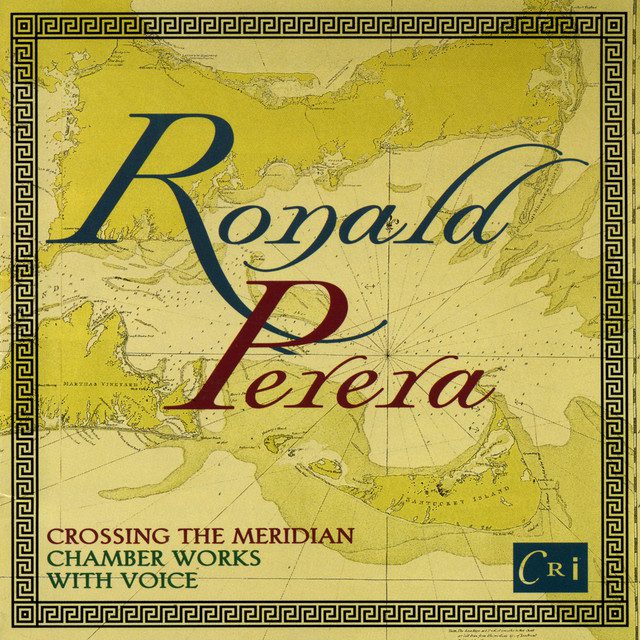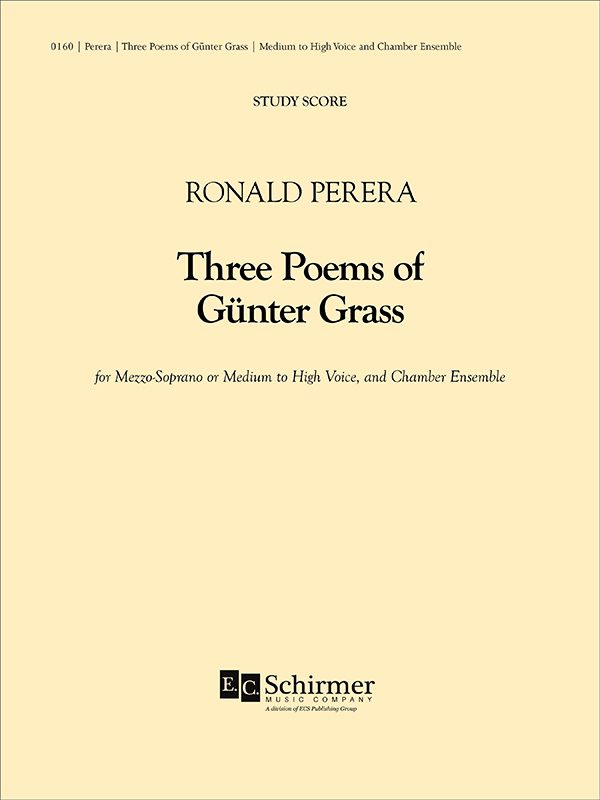Mezzo-Soprano and Flute (doubling piccolo, alto flute), clarinet (doubling bass clarinet, alto sax), violin, viola, cello, piano, tape
Commissioned by Boston Musica Viva. Three poems by the German author reflecting on Germany after World War II. The first poem, “Gleisdreieck,” was inspired by the train station of the same name on Berlin’s elevated railway. The second poem, “Klappstühle” (“Folding Chairs”), uses the chairs as a metaphor for the impermanence of home caused by the war. The final poem, “Schlaflos” (“Sleepless”), is the nightmarish vision of a man with insomnia counting himself to sleep by recounting his life. Eventually he confronts his own and his nation’s guilt, for which it seems there is no atonement.

Crossing the Meridian is the title work on the CD Crossing the Meridian, which offers a collection of Ronald Perera’s works for chamber music with voice. It includes Crossing the Meridian, Three Poems of Günter Grass, Visions and Alternate Routes. Performed by the Boston Musica Viva. Soloists include Elsa Charlston, John Aler, Jane Bryden, and Karen Smith Emerson. On CRI. Available on:
Amazon
iTunes
Movements:
- Gleisdreieck
- Klappstühle
- Schlaflos
| Composed: | 1974 |
| Duration: | 22:00 |
| Publisher: | E. C. Schirmer Music Company |
| Catalog Number(s): | 0160, Study Score Instrumental parts available for rental. |
Reviews:
Ronald Perera’s “Three Poems of Günter Grass” used tape and imaginative ensemble writing to vividly conjure the melancholy anguish of life in postwar Germany.
The Boston Globe, Boston, MA, 2008
Ronald Perera’s setting of Günter Grass poems, commissioned in1974 and mixing electronic tape with voice (the estimable Pamela Dellal), spoken word and instruments, showed that trendy doesn’t have to go out of date if done well.
Boston Herald, Boston, MA, September, 2008
This time around I caught your Grass songs, and, to say something outrageously self-centered, it was one of the few times I regretted that I was not writing. They are a so compelling, sensitive, imaginative extension of the poetry, and one of the things I found especially exciting was your courage, as it were, in making them the point of departure for really big pieces of music.
Letter to the composer 12/15/75 from Michael Steinberg, former Boston Globe music critic, former Artistic Advisor, San Francisco Symphony
Mr. Perera’s musical language is a blend of avant garde vocal and instrumental techniques (sprechstimme, aleatory passages, use of string and wind microtones, prepared piano, etc.) and the semi-popular sound worlds of Kurt Weill and Johann Strauss. The composer combines these elements in a very dramatic setting of three poems which, although symbolic rather than explicit, make powerful statements about the recent political history of Germany.
NATS Bulletin 5/78
The most interesting work on Stock’s concert was Perera’s song-cycle, a powerful setting of Grass’ disturbing poems in which the human voice is accompanied by six instruments and electronic tape.
Pittsburgh Post-Gazette 3/2/81
Shapely lines wound through a leisurely and well-integrated texture for tape and instruments, overlain by a collage of quotations and memories: Strauss waltzes, political songs, the sounds of the Berlin overhead railway.
The Independent (London) 10/20/88
Three Poems of Günter Grass is, quite simply, one of the most haunting works of the last 25 years. Scoring for soprano, chamber ensemble, and electronic tape, composer Ronald Perera sets three poems by the German author depicting different aspects of Germany after the Second World War. The tape is used to provide musique concrete derived from the sounds of Germany—a departing train, a military march, a Nazi rally (the unmistakable voice of Hitler is very evident in the third song)—in effect local color for the eloquent soprano line and imaginative instrumental writing. The first song, Gleisdreieck, was inspired by the train station of the same name on Berlin’s elevated railway. Prior to the Berlin Wall it was where one crossed the frontier from west to east. Grass uses it as a metaphor for the rootlessness of postwar German society, and Perera sets it to a variety of train sounds, real and musical. The second song, Folding Chairs (I give the titles in English; the cycle is sung in German), uses the chairs as a metaphor for the impermanence of home caused by the war. Perera sets it to ghostly, distorted reminiscences of Strauss’s Kunstlersleben (Artist’s Life). The vocal line is itself a ghost of the many arrangements of Strauss waltzes for soprano and orchestra, complete with climactic high note, a phantom of a culture devastated by the Nazis. The final song, Sleepless, is the nightmarish vision of a man with insomnia counting himself to sleep by recounting his life. Eventually he recounts the guilt of his actions during the war, a guilt for which there is no atonement. Words do not convey the power of this 20 minutes or so of music, as wrenching in its way as Schoenberg’s harrowing A Survivor from Warsaw. The fine soloist, Elsa Charlston, is beyond praise.
John Story, Fanfare Magazine, January/February 1999

